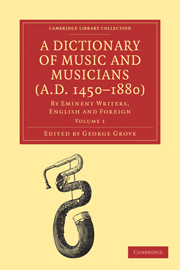Summary
The name of the seventh degree of the natural scale of C. In French and Italian it is called Si, and in German H (Ha), the name B being given to our Bb. The reason of this anomalous arrangement is explained in the article Accidentals.
B is an important note in the history of the musical scale, since its addition to the hexachord of Guido, which contained only six notes, transformed the hexachord at once into the modern scale of seven sounds, and obviated the necessity for the so-called mutations or changes of name which were required whenever the melody passed beyond the limits of the six notes forming a hexachord (see that word). The date of the first recognition of a seventh sound in addition to the six already belonging to the hexachord is uncertain, but Burmeister, writing in 1599, speaks of the additional note as nota adventitia, from which it would appear that it had not then come into general use.
At the time when the necessity for the introduction of accidentals began to be felt, B was the first note which was subjected to alteration, by being sung a semitone lower, and as it was considered that this change had the effect of making the melody softer and less harsh, the altered B (Bb) was called B molle, while the original B received the name of B durum.
- Type
- Chapter
- Information
- A Dictionary of Music and Musicians (A.D. 1450–1880)By Eminent Writers, English and Foreign, pp. 107 - 289Publisher: Cambridge University PressPrint publication year: 2009First published in: 1879



